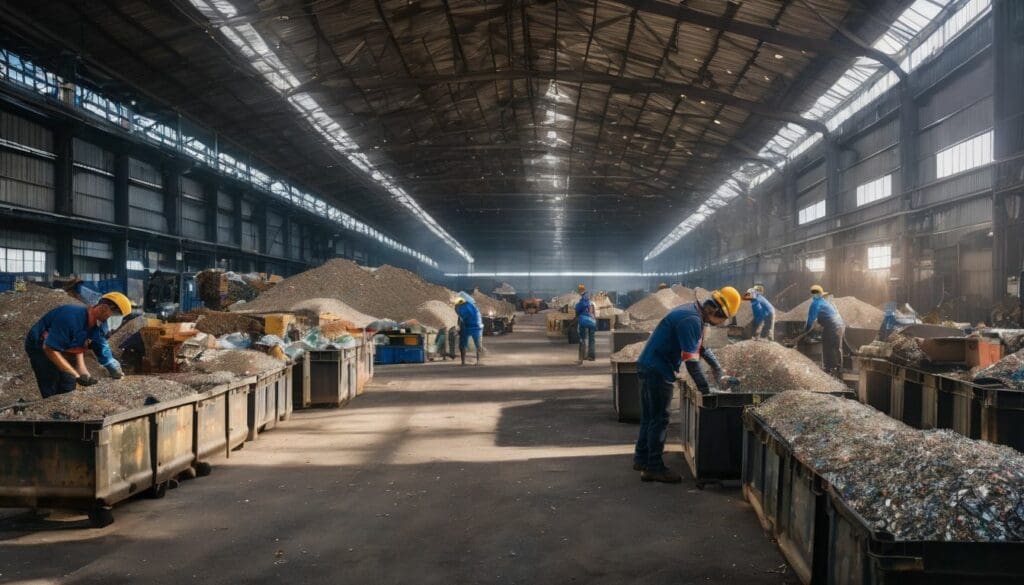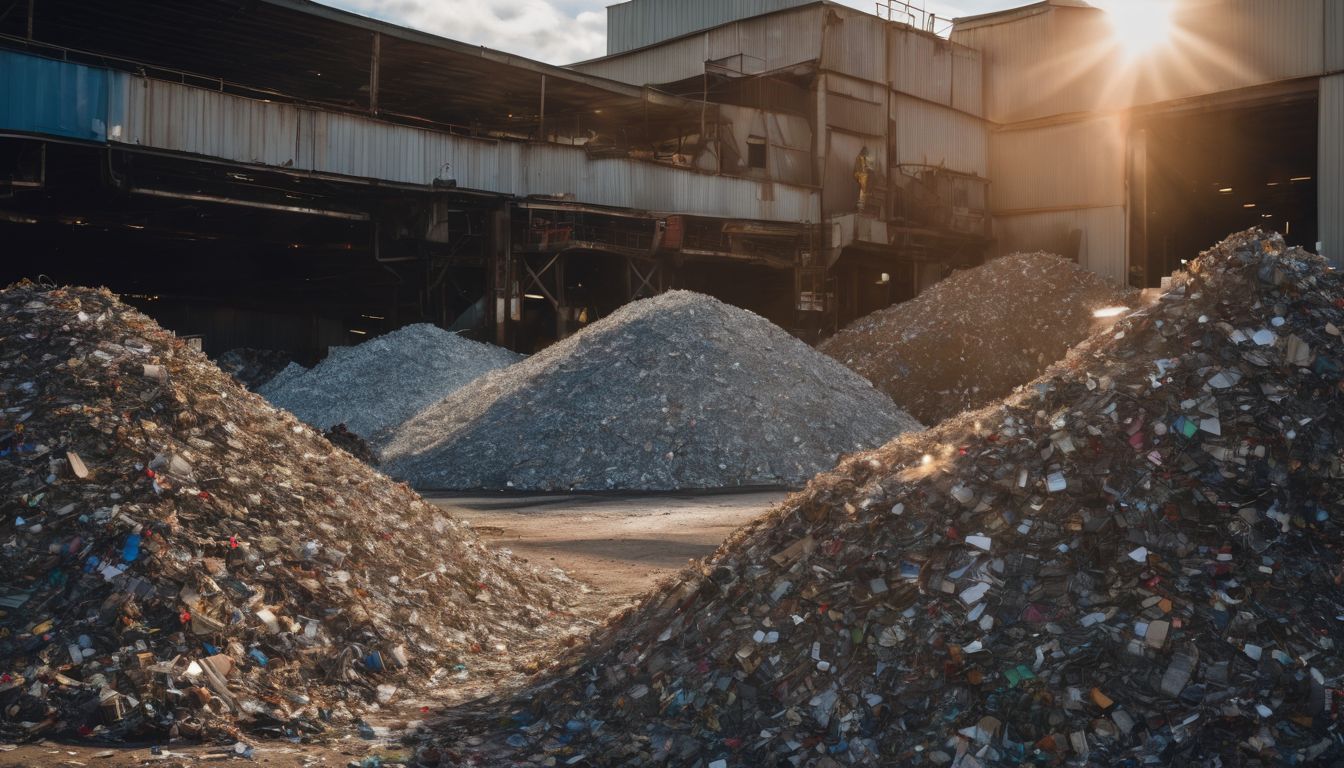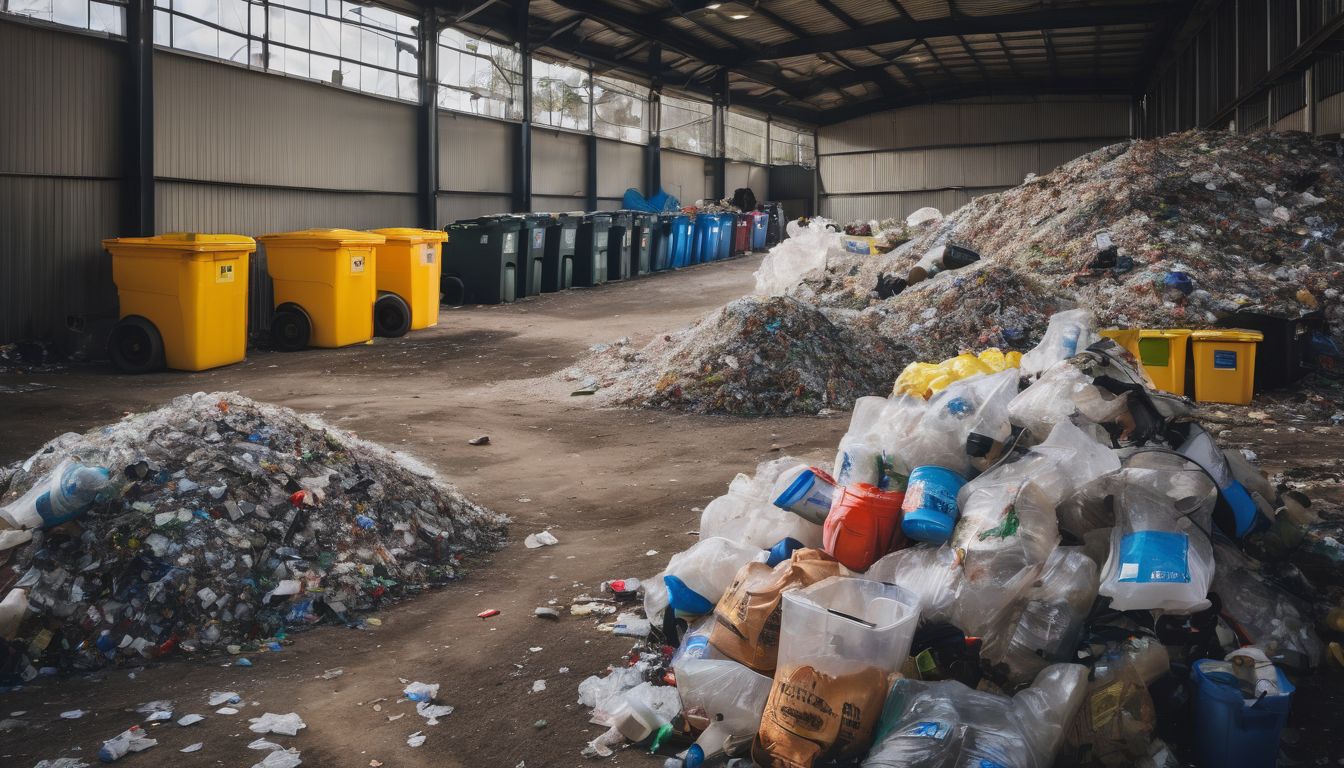Businesses today face the challenge of managing waste effectively while considering environmental impacts. A surprising fact is that companies can save up to 20% on waste disposal costs by implementing simple recycling strategies.
This article guides you through setting up a successful recycling programme within your business, helping to reduce waste and promote sustainability. Discover how to turn trash into treasure and secure a greener future for us all.
Key Takeaways
- Companies can cut waste disposal costs by up to 20% with simple recycling strategies, helping the environment and saving money.
- A waste audit is important for starting a recycling program as it shows what and how much rubbish a business produces.
- Involving workers is key; when they understand why recycling matters, they’re more likely to join in.
- Proper bins and regular pick – up schedules are essential for managing recyclable materials efficiently.
- Using technology like sensors, sorting machines, and data software makes recycling programs work better.
Understanding the Importance of Industrial Recycling
Industrial recycling plays a critical role in sustainable materials management. By reprocessing used materials, companies not only reduce the volume of waste ending up in landfills but also conserve natural resources.
This shift towards resource conservation is key to cutting down on environmental pollution and trimming energy consumption during production processes.
Adopting sustainable practices within industries leads directly to smaller carbon footprints and signifies a commitment to corporate sustainability. Effective recycling initiatives can significantly lower operational costs too, as recycled materials often cost less than virgin raw materials.
As we consider further steps for implementing an effective recycling program, it’s clear that getting everyone involved is essential, which points us towards the power of employee engagement in achieving our recycling goals.
Key Steps to Implement an Effective Recycling Program
Assessing and planning for recycling program, engaging employees in the process, establishing infrastructure and logistics for efficient waste collection are crucial steps for successful implementation.
Tracking and reporting progress, along with focusing on continuous improvement, are also essential to ensure a sustainable recycling strategy.
Assessment and planning
Before implementing a recycling program, businesses need to conduct a waste audit to identify the types and volume of waste generated. This assessment is crucial for understanding current waste management practices and areas for improvement.
Following the audit, companies can develop companywide policies and allocate resources for effective recycling initiatives. Planning involves setting clear goals, identifying key stakeholders, determining budget allocation for infrastructure improvements, and establishing sustainable waste reduction targets.
Once the assessment phase is completed, companies can move on to planning by developing strategies to engage employees in recycling efforts. Additionally, they must plan for infrastructure changes such as installing recycling bins at strategic locations within the facility and arranging logistics for efficient materials collection.
Employee engagement
Engaging employees in recycling initiatives fosters a sense of environmental responsibility. By encouraging participation and providing education on the importance of recycling, businesses can create a culture committed to sustainable practices.
Employee engagement is an integral part of creating eco-friendly solutions and promoting environmental stewardship within the workplace.
By involving employees in recycling programmes, companies can harness their collective efforts towards building a circular economy and contributing to a sustainable future for all.
Engaged employees become ambassadors for green initiatives, driving positive change both within the organisation and beyond.
Infrastructure and logistics
To establish an effective recycling program, businesses need to ensure that their infrastructure and logistics support the collection and processing of recyclable materials. This involves setting up designated recycling stations throughout the premises for easy access by employees.
Additionally, arranging for regular collections of recyclables ensures a smooth flow in the recycling process. Implementing eco-friendly solutions such as energy-efficient machinery for material processing can significantly reduce the environmental impact of these operations.
The logistics aspect also includes establishing partnerships with reliable waste management companies or recycling facilities to efficiently handle and transport collected materials.
Materials collection
To establish an effective recycling programme, businesses must prioritise materials collection. This involves setting up designated collection points for recyclable items such as paper, plastics, and aluminium cans.
Employees should be encouraged to deposit these materials in the allocated bins around the premises. Regular collection schedules then ensure that the gathered recyclables are efficiently transported to recycling facilities for processing.
Once businesses have established a streamlined materials collection process, they can move on to the next step: tracking and reporting their recycling efforts.
Tracking and reporting
To ensure the success of your recycling program, it’s crucial to track and report on your progress regularly. By monitoring the amount and types of materials being recycled, you can identify areas for improvement and make informed decisions about where to focus your efforts.
Reporting on these metrics not only helps in gauging the effectiveness of your program but also allows you to share achievements with stakeholders and employees, fostering a sense of pride and accountability.
Tracking and reporting are essential for maintaining transparency and credibility in your recycling efforts. Regularly sharing data on waste diversion rates, cost savings, and environmental impact demonstrates a commitment to sustainability that resonates with environmentally conscious individuals.
Continuous improvement
Continuous improvement is a vital aspect of any successful recycling programme. Businesses should regularly evaluate their processes, identify areas for enhancement, and implement changes to increase efficiency and effectiveness.
This ongoing commitment to improvement ensures that the recycling programme adapts to changing needs and environmental standards, making it more impactful in the long run.
By continuously seeking ways to streamline operations, reduce waste, and enhance resource recovery, businesses can stay ahead of the curve in eco-friendly solutions. It’s essential for environmentally conscious individuals to support initiatives that prioritise continuous improvement as it demonstrates a commitment to sustainable practices that benefit our planet.
The Power of Employee Engagement
Employee engagement is vital in ensuring the success of a recycling program within a business. Engaged employees are more likely to embrace eco-friendly solutions, such as effective recycling strategies, and actively participate in waste reduction initiatives.
When employees feel involved and valued, they are motivated to contribute towards conservation efforts and environmental sustainability. By fostering a culture of awareness and responsibility, businesses can harness the power of employee engagement to drive positive change and achieve their recycling goals.
Encouraging active involvement from employees in the implementation and maintenance of a recycling program not only enhances environmental impact but also cultivates a sense of collective responsibility towards sustainable practices.
Providing opportunities for staff to share ideas, take ownership of specific tasks, and celebrate achievements can further bolster engagement levels and establish a lasting commitment to environmentally conscious actions.
https://www.youtube.com/watch?v=9lvJxKoiAhA
The Role of Technology in Successful Recycling Programs
Technology plays a crucial role in successful recycling programs, enabling efficient collection, sorting, and processing of materials. Advanced sensors and sorting equipment help streamline the separation of recyclables from waste, improving overall efficiency.
In addition, innovative software and data analytics allow for better tracking and reporting of recycling efforts. This technology provides valuable insights into performance metrics, helping businesses identify areas for improvement and make data-driven decisions to enhance their recycling strategies.
By leveraging these technological advancements, businesses can significantly enhance the effectiveness of their recycling programs while supporting conservation efforts.
Next heading: 6. Conclusion.
Conclusion
In conclusion, businesses can implement effective recycling strategies by assessing their current practices and creating a detailed plan. Engaging employees in the process ensures that everyone is on board with the initiative.
Establishing the necessary infrastructure and logistics for materials collection is crucial for successful recycling programs. Tracking and reporting progress allows for continuous improvement and adaptation to changing needs.
Moving forward, consistent efforts will lead to a more sustainable and eco-friendly business environment while supporting conservation efforts.
FAQs
1. What are effective recycling strategies for businesses?
Effective recycling strategies for businesses include setting up clear recycling guidelines, using eco-friendly solutions, and educating employees on sustainable waste management practices.
2. How can a company start an eco-friendly recycling program?
A company can begin an eco-friendly recycling program by assessing their waste, selecting the right recycling bins, and partnering with local recycling facilities to manage materials responsibly.
3. Why should businesses focus on implementing recycling strategies?
Businesses should implement effective recycling strategies to reduce environmental impact, comply with regulations, save resources and often cut down costs in the long term.
4. Who is responsible for ensuring that a business’s recycling strategy works?
While leadership should drive the initiative, every employee is responsible for making sure that the business’s effective waste management and recycling strategy work properly day-to-day.





